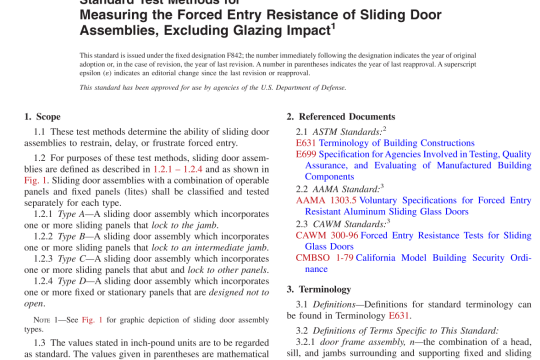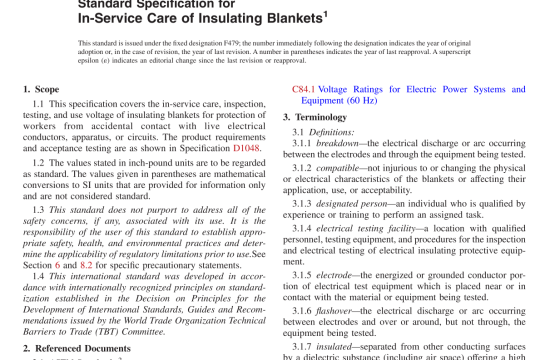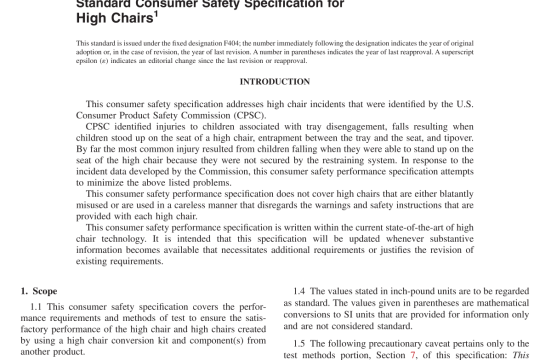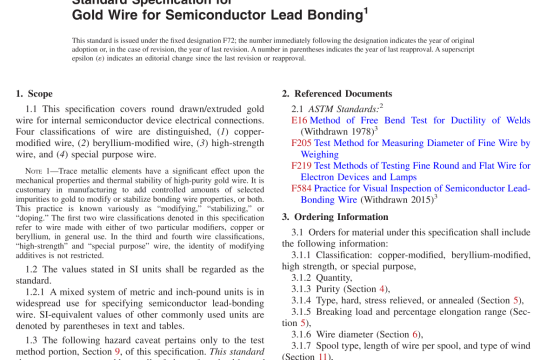ASTM F799-2019 pdf free download
ASTM F799-2019 pdf free download,Standard Specification for Cobalt-28 Chromium-6 Molybdenum Alloy Forgings for Surgical Implants (UNS R31537, R31538, R31539)
1. Scope
1.1 This specification covers requirements of cobalt-28 chromium-6 molybdenum alloy (UNS R31537, R31538, R31539) high-strength forgings for the manufacture ofsurgical implants. The properties specified in this document specifically apply to finished or semifinished parts that receive no subse- quent thermomechanical processing. 1.2 Wrought material to be used as forging stock in the manufacture of forgings conforming to this specification, typically hot worked and unannealed with a surface finish suitable for forging, shall be fabricated and supplied in accordance with Specification F1537. 1.3 Units—The SI units in this standard are the primary units. The values stated in either primary SI units or secondary inch-pound units are to be regarded separately as standard. The values stated in each system may not be exact equivalents; therefore, each system shall be used independently ofthe other. Combining values from the two systems may result in non- conformance with the standard. 1.4 This international standard was developed in accor- dance with internationally recognized principles on standard- ization established in the Decision on Principles for the Development of International Standards, Guides and Recom- mendations issued by the World Trade Organization Technical Barriers to Trade (TBT) Committee.
5. Materials and Manufacture
5.1 Materials for forgings shall be bar, rod, or wire fabri- cated in accordance with Specification F1537. 5.2 The material shall be forged by hammering, pressing, rolling, extruding, or upsetting, and shall be processed, if practical, so as to cause metal flow during the hot-working operation to be in the most favorable direction for resisting stresses encountered in service, as may be indicated to the supplier by the purchaser. 5.3 Forgings shall be free of splits, scale, cracks, flaws, and other imperfections not consistent with good commercial practice (see Note 1). Offset or mismatch allowance, dependent upon part size and configuration, shall be within standard forging tolerances. 5.4 Optional identification marks, including the purchaser’s logo, material designation, heat code number, and impression number, may be placed upon each forging, the method and location of which shall be as specified by the purchaser. N OTE 1—Compliance with these requirements may be verified by Practice E165/E165M or Practice F601, or other suitable methods.
7. Mechanical Requirements
7.1 Tensile Properties: 7.1.1 Tensile properties shall be determined in accordance with Test Methods E8/E8M. 7.1.2 The mechanical properties of test specimens prepared from finished or semifinished parts shall conform to the requirements in Table 1. 7.1.3 Tension test specimens shall be produced from fin- ished or semi-finished parts or from material having the same process history as that which exists in the final forging. Tension specimens may have a ground finish on the reduced section and may be taken in a direction parallel to the long axis of the finished or semi-finished part. 7.1.4 A minimum of two tension test specimens shall be tested. Should either of the two specimens not meet the specified requirements, two additional specimens shall be tested and both must pass. 7.1.5 If any fracture takes place outside the middle half of the gauge length or in a punched or scribed gauge mark within the reduced section, the elongation value obtained may not be representative of the material. In acceptance testing, if the elongation so measured meets the minimum requirements specified, no further testing is required, but if the elongation is less than the minimum requirements, discard the test and retest. 7.1.6 In some instances, mechanical test pieces may not be obtainable directly from forged parts due to their configuration or small size. Instead of mechanical testing, these parts shall exhibit hardness of HRC 35 to 45 when tested in accordance with Test Methods E18. 7.2 Hardness—Forgings conforming to this specification shall have a minimum Rockwell C hardness of 35 HRC. The hardness determination shall be performed in accordance with Test Methods E18.




